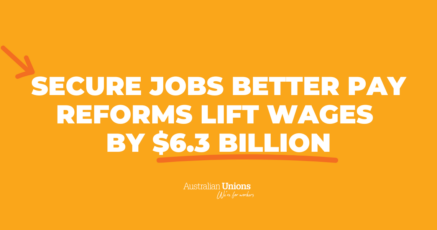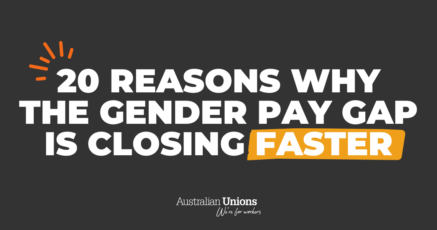Menopause affecting your work? You’re far from alone.
Australian women are retiring years before they planned to, due to a lack of workplace support to address the symptoms of menopause and other reproductive health conditions.
Workers should never have to choose between their health and their working lives and income. That’s why union members are fighting for 10 days paid reproductive leave for all workers.
A united call for paid reproductive leave
Last week the ACTU told a Senate inquiry examining this issue that a quarter of Australian working women retire before the age of 55 – up to 12 years earlier than they desire, and seven years earlier than men.
The financial consequences for women – and the economy – are staggering, with over $112 billion in lost wages and superannuation for Australian women who retire prematurely.
The issue is widespread. More than 80% of women experiencing menopause say their work is negatively affected, and 70% report that they don’t feel comfortable discussing support options with their managers.
“A big part about being menopausal at work is that it’s embarrassing, and finding the right person to tell who won’t pity you, tell anyone and will still continue to value your work, is very rare.
It needs to become normalised as it’s a normal part of living the human experience.”
– Robyn, Mental Health Nurse and Health & Safety Rep, VIC
Campaigning for change
Working women are calling for change, and unions are already bargaining in workplaces across the country for the right to 10 days paid reproductive leave and flexible working arrangements to manage reproductive health issues and remain in work.
And now we’re calling for 10 days of paid reproductive leave to be included in the National Employment Standards.
This much-needed reform would allow workers to take time off to manage reproductive health issues – including menopause – ensuring they can continue to work without compromising their health and well-being.
Despite menopause being a natural life phase that half the population will experience, it remains poorly understood and often shrouded in taboo.
This culture of silence hides the significant impact menopause can have on workers.
What the leave would cover
These provisions are essential for managing reproductive health issues and enabling women in particular to remain in the workforce.
The proposed leave entitlement would cover a range of issues that both men and women, including:
- menstruation
- pregnancy
- contraception
- miscarriage
- poly-cystic ovarian syndrome
- endometriosis
- hormone therapy
- fertility treatments
- vasectomy
- hysterectomy
- termination
- screenings for breast and prostate cancer.
Historic wins and future goals
Unions have played a pivotal role in securing workplace rights for women, from equal pay to paid parental leave.
Each victory has enhanced womens’ ability to work with dignity and retire with financial security. The current campaign for paid reproductive leave is no different.
You can be a part of it too: win positive change for workers by joining your union.







SHARE:
Breaking the silence: union members campaign for paid reproductive leave